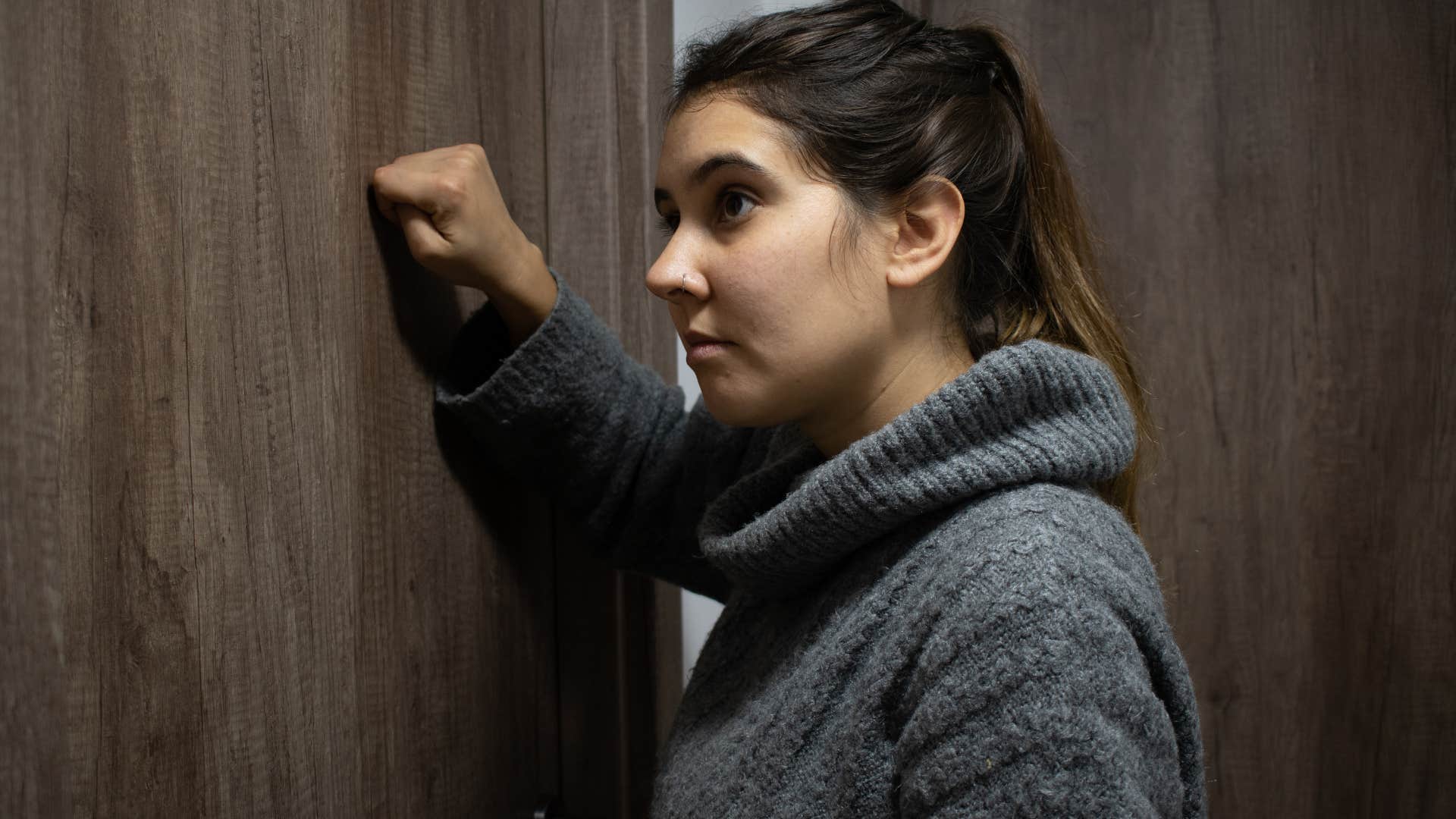Parents With Close Bonds To Their Adult Kids Usually Have These 11 Boundaries Without Realizing It
Being a "perfect" parent is impossible, but being a committed one is well within reach.
 PeopleImages.com - Yuri A | Shutterstock
PeopleImages.com - Yuri A | Shutterstock Maintaining a healthy relationship, especially with close personal bonds, between parents and their kids into adulthood is no easy feat. Oftentimes, there's unsolved trauma and resentment that make it truly difficult to heal and maintain that productive relationship as time moves on.
However, there are certain boundaries parents with close bonds to their adult kids usually have that help to make emotional space for growth, even when there's physical separation.
Here are 11 boundaries parents with close bonds to their adult kids usually have
1. They respect privacy by knocking before entering
 Santiago Silvano | Shutterstock.com
Santiago Silvano | Shutterstock.com
Even for adult children living at home with their parents, a societal trend that's becoming increasingly popular in recent generations, according to Pew Research Center, parents can unknowingly set boundaries around personal space and privacy that help their bonds to grow closer.
By knocking before entering their kids' spaces, they reinforce that boundary. By giving busy or exhausted kids room to relax without judgment, they reinforce that boundary. A million other subtle behaviors and tendencies in a shared household — and a relationship with more physical space — can reassure parents and kids that their space is valued and respected.
2. They have clear expectations for 'success'
 imtmphoto | Shutterstock.com
imtmphoto | Shutterstock.com
Instead of punishing and judging their kids based on vague or unrealistic expectations, parents with close bonds to their adult children guide their kids by promoting an achievable, fulfilling, and satisfying sense of success.
Sometimes, that manifests as a commitment to integrity. Other times, it's a more practical achievement of a goal — or the journey of "trying their best" that they value most as a parent. Either way, they make their expectations for their kids incredibly clear, leaving no room for disappointment, unnecessary criticism, or mistrust in their relationships.
3. They accept and celebrate emotion
 Fizkes | Shutterstock.com
Fizkes | Shutterstock.com
Especially early in life, parents with close bonds to their adult kids prioritize emotional intelligence, even if it means listening quietly amid a toddler's tantrum or giving their teenager space to express their concerns. Even if they're not on the same page or having a disagreement, and experience many adult children can relate to, they're committed to hearing out their kids' emotions.
This boundary might manifest as necessary space when one person's emotions feel dismissed or even intentionally committing to active listening in a disagreement, but either way, they make it a priority.
4. They respect their kids' autonomy and decision-making skills
 Grusho Anna | Shutterstock.com
Grusho Anna | Shutterstock.com
The basis for a close bond and healthy relationship between parents and their adult kids is respect, and while it might seem easy to achieve, it's often incredibly difficult for people to master, especially with parents who struggle to see their kids in their adult identity. Whether it's nostalgia or a need for control that informs this misguided mindset, like psychologist Jeffrey Bernstein argues, it makes it near impossible for parents to take a step back and respect their adult kids' decisions, life choices, and autonomy.
Parents with close bonds to their adult kids have mastered this boundary, reminding themselves in every interaction and disagreement that their kids have the tools, techniques, and autonomy to make the decisions that are best for them, often guided by the parenting lessons they've already instilled in them.
5. They only share advice when they're asked for it
 Fizkes | Shutterstock.com
Fizkes | Shutterstock.com
Unprompted advice from parents can be a huge motivator for resentful feelings in adult children. They're adults who make their decisions and build their own lives without constant guidance, so they're more driven to seek comfort and a listening ear from their parents rather than direct advice.
Family therapist Sarah Epstein argues that this unprompted, and often unnecessary, advice often subtly sabotages healthy conversation and bonds.
6. They have a close familial bond, not a friendship
 Chay_Tee | Shutterstock.com
Chay_Tee | Shutterstock.com
According to psychology expert and author Peg Streep, it's possible to have a close bond between parents and adult children without crossing into "friendship" territory. There are still some boundaries around what's appropriate and productive to discuss, especially when it comes to other siblings, partners, or parents.
Unlike other platonic friendships that tend to be sources of support for all kinds of struggles, intimate and otherwise, a parent or adult child should never be the main source of guidance in each other's lives. It not only tends to spark emotional burdens and anxiety in a familial bond, it can spark resentment that's difficult to address and overcome.
7. They make space for differing opinions and views
 Prostock-studio | Shutterstock.com
Prostock-studio | Shutterstock.com
Parents with close bonds to their adult kids usually experience safety, comfort, and security in their relationship — unconcerned with the anxiety of abandonment amid conflict or disagreement. This isn't just sparked in adulthood; these kinds of relationships have been cultivated since childhood, where parents celebrate their kids' differing views and let them speak openly without judgment or unnecessary critique.
While a study from The Gerontologist argues that lifestyle choices, habits, routines, and values tend to be the source of tension for the majority of parent-child relationships into adulthood, those with close bonds have solidified that communicative boundary. They're allowed to share, debate, and discuss without fear that they'll hurt the relationship or be judged.
8. They have mutual respect for each other's schedules
 Inside Creative House | Shutterstock.com
Inside Creative House | Shutterstock.com
Whether parents and their adult children are living separately or together, respect for each other's schedules, in addition to the privacy of their spaces, is incredibly important — and many relationships founded on close bonds re-assert those boundaries with small behaviors every day.
From splitting household responsibilities, to communicating social time together, to dropping by unannounced, they communicate the basic respectful expectations they have for each other, so there's no built up resentment or misunderstanding fueling a divide.
9. They're clear about financial support
 Prostock-studio | Shutterstock.com
Prostock-studio | Shutterstock.com
A 2024 study on financial support reported that nearly 50% of parents still cover costs and financially support their adult children, with the average child receiving nearly $1,400 from their parents every month in a variety of ways.
Whether or not parents with close bonds financially support their kids is another conversation, but for those that do, there's no taking advantage of it on either end. Everyone is on the same page about who buys what, where they need help, and the societal pressures keeping younger generations from easily becoming financially comfortable.
10. They're open communicators, when the time is right
 Fizkes | Shutterstock.com
Fizkes | Shutterstock.com
Navigating communication with an adult child isn't easy — they grow up, start their own lives, and arguably remove their parents as "the center of their world," as the Newport Institute suggests, requiring new boundaries and expectations in their relationship.
Of course, it's not just content and communication expectations that shift in these relationships, it's also the timing. When is it appropriate for a parent to provide advice to their adult kids? When should an adult kid intervene when they're feeling disrespected or unheard? These new boundaries are crafted over time, and often require some disagreement or resentment to truly address and resolve.
11. They don't expect perfection by celebrating mistakes
 Pics Five | Shutterstock.com
Pics Five | Shutterstock.com
Oftentimes, parents who hold their children to unrealistic expectations of perfection only spark feelings of shame and guilt in their kids. Those uncomfortable emotions, sparked by childhood perfectionism, follow them into adulthood with behaviors like suppressing their emotions or prioritizing pleasing others, according to the Silver Line Recovery organization.
Parents with healthy bonds with their kids did the opposite in childhood. They openly talked about and even celebrated mistakes, allowing their kids to enter adulthood with a more level-headed, emotionally intelligent, and graceful attitude towards life's challenges.
Zayda Slabbekoorn is a staff writer with a bachelor's degree in social relations & policy and gender studies who focuses on psychology, relationships, self-help, and human interest stories.

